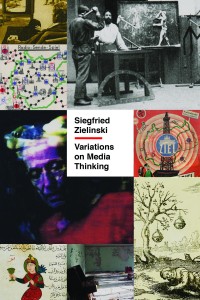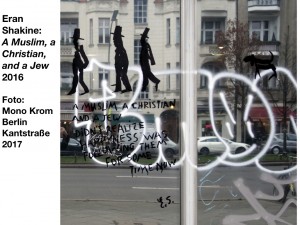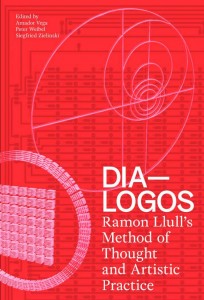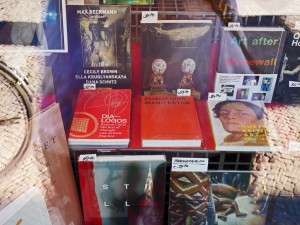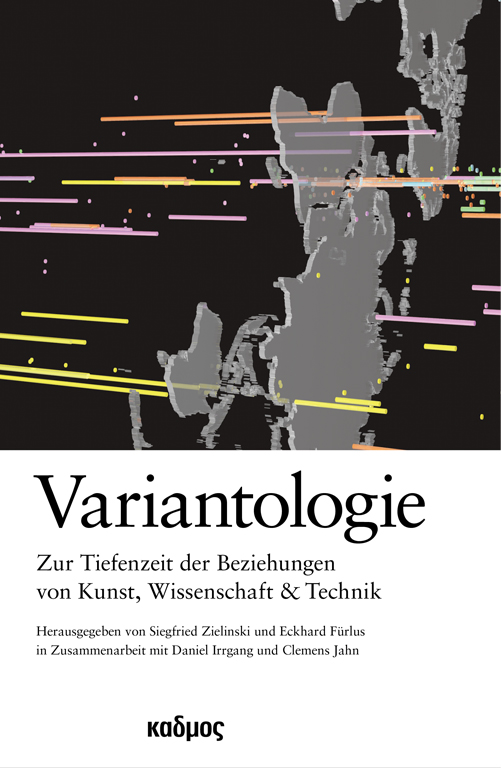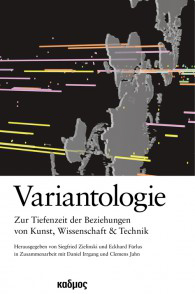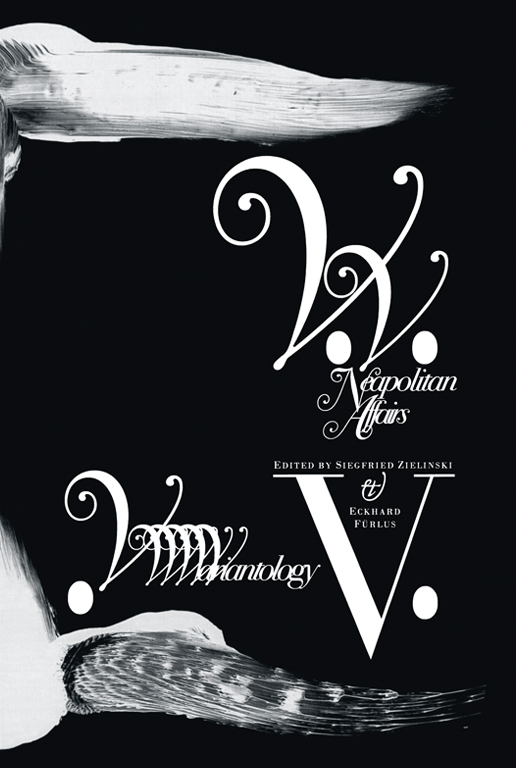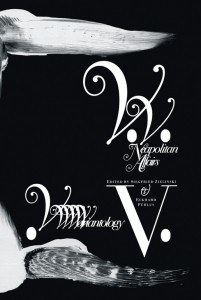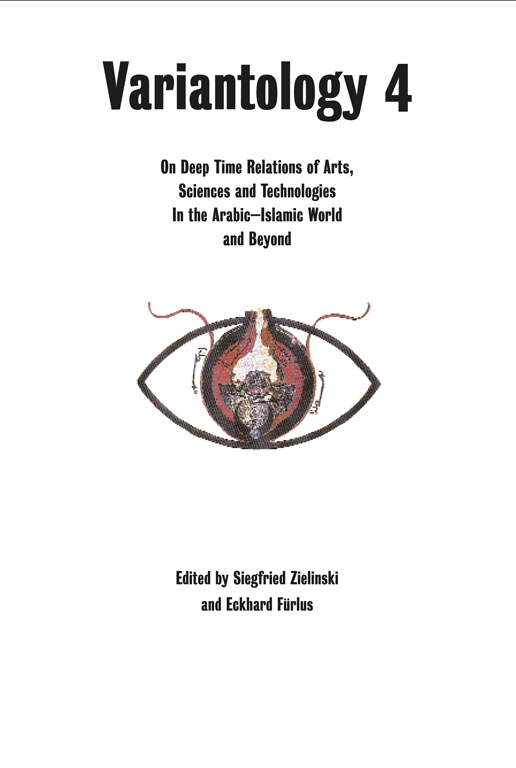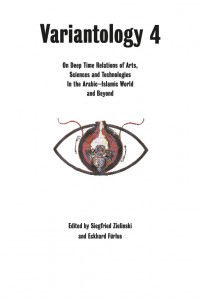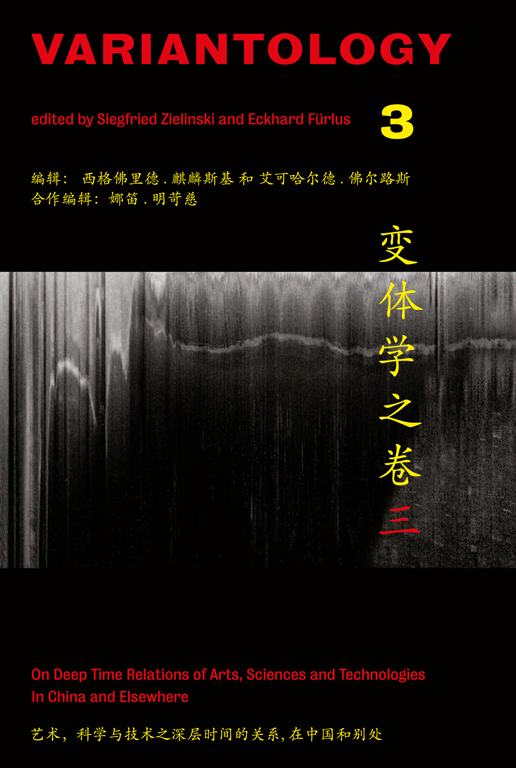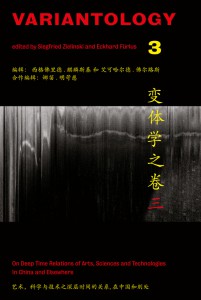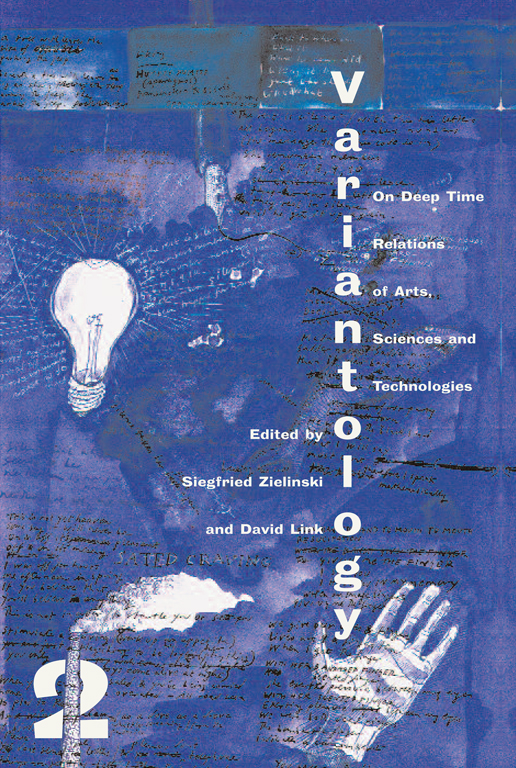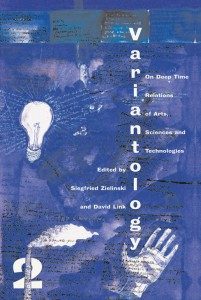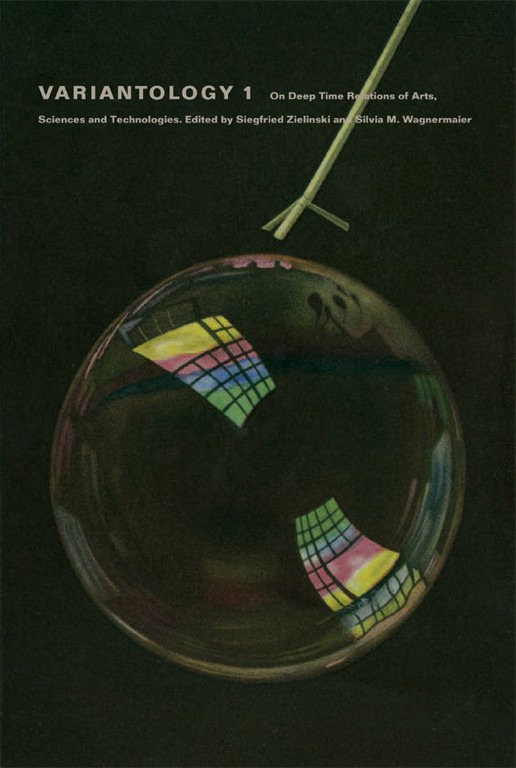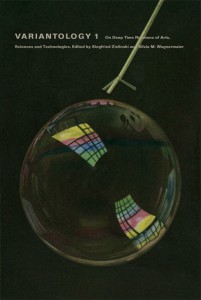Siegfried Zielinski
Variations on Media Thinking
(Minneapolis: University of Minnesota Press, 2019)
Expanding on Siegfried Zielinski’s groundbreaking inquiry into “deep time” of the media, these essays foster the eminent media theorist’s unique method of expanded hermeneutics, which means for him interpreting technical artifacts as essential parts of our cultural lives. Including many previously untranslated and scarce essays, these “written time machines” further diversify Zielinski’s insight into the hidden layers of media development.
Historians of technology know that any tool is also an instrument of exploration, experiment, and simulation. Siegfried Zielinski reminds us that any technology is also a generator of wonder. In fact, Zielinski does not write media history, he writes world history through the generative lens of media as machines of speculation and imagination. This is a material history of dissent, heretical hermeneutics, and electrified alchemic curiosity. – Matteo Pasquinelli
DIA–LOGOS
Ramon Llull’s Method of Thought and Artistic Practice
The life and work of the outstanding Catalan-Majorcan philosopher, logician,
and mystic Ramon Llull continues to fascinate thinkers, artists, and scholars
worldwide. The primary idea of Ramon Llull’s teachings – to enable rational
and therefore trustworthy dialogue between cultures and religions through a
universally valid system of symbols – is today still topical and of great
relevance, especially in the tensions prevailing in globalized spaces of
possibility. In this book, international experts address Lullism as a remarkable
and distinctive method of thinking and experimenting.
(Englisch, 472 pp., ca. 300 illustrations, ISBN 978-1-5179-0609-2)
Buchhandlung Walther König, Burgstraße 27, 10178 Berlin
We are glad to have physicist and chaos theoretician Otto E. Rössler as our guest. He will speak about his approach towards variantology, followed by a talk with him and the editors, Eckhard Fürlus and Siegfried Zielinski. Daniel Irrgang and Clemens Jahn will present their diagrammatic work, which is included in the volume.
Zur Tiefenzeit der Beziehungen von Kunst, Wissenschaft und Technik
in collaboration with Daniel Irrgang and Clemens Jahn
For the first German-language volume in the Variantology series a selection of texts from the previous English-language volumes has been translated. The book contains, amongst others, essays on Athanasius Kircher, Giordano Bruno and Ramon Llull, on the meaning of vowels in Arabic music, on Alan Turing’s and Christopher Stratchey’s love letter program, on the variant in mathematics, on acoustics in ancient China, on gender politics in the late Chinese empire, on the automaton theater in Arabia, on the compass, on mathematical thinking in China and Europe, on John Cage’s mycology as well as on the design of an Institute of Southern Modernities (ISMs).
With contributions by Nanni Balestrini (Paris / Rom), Hans Belting Karlsruhe / Berlin), Arianna Borrelli (Rom / Berlin), Francesca Bray (Edinburgh), Luciano Canfora (Bari), Chen (Joseph) Cheng-Yih (San Diego), Eckhard Fürlus (Berlin), Claus-Peter Haase (Berlin), Yasmin Haskell (Perth), Daniel Irrgang (Berlin), Clemens Jahn (Berlin), David Link (Köln / Leipzig), Mara Mills (New York), Nils Röller (Zürich), Otto E. Rössler (Tübingen), George Saliba (Beirut / New York), Elisabeth von Samsonow (Wien), Wilhelm Schmidt-Biggemann (Berlin), Amnon Shiloah (Jerusalem), Amador Vega Esquerra (Barcelona), Xu Fei (Hefei), Siegfried Zielinski (Berlin) and Peter Weibel (Karlsruhe).
Kulturverlag Kadmos
ISBN 978-3-86599-188-1
Neapolitan Affairs
in cooperation with Daniel Irrgang
Naples: Although it has a long history, many consider the city does not have a future — its present-day state is seen as too ugly. The Biblioteca Nazionale di Napoli is one of Europe’s most beautiful — and decadent — collections of books and manuscripts. There the Variantologists met for their last congress (for the time being) and attempted Vesuvian thinking, initiated by the vulcanologist and Vesuvius expert Giovanni P. Ricciardi’s introduction. Their discussions traversed the deep time of the city and explored its media, philosophers, scientists, and scholars.
Those who engaged with Neapolitan affairs in Naples, and whose contributions are published in this volume, were the art experts Hans Belting and John Berger, the artists Rosa Barba and Peter Blegvad, the papyrologist Luciano Canfora, the mathematician Chen Cheng-Yih, the physicist Otto E. Roessler, and the philosopher and artist Elisabeth von Samsonow. Early machine poetry texts by the experimental poet Nanni Balestrini are published here for the first time. The artistic design of Variantology Volume 5 was created by the legendary Brothers Quay.
Verlag der Buchhandlung Walther König
ISBN 978-3-86560-887-1
Download:
Table of contents and introduction (PDF)
On Deep Time Relations of Arts, Sciences and Technologies
In the Arabic-Islamic World and Beyond
in cooperation with Daniel Irrgang and Franziska Latell
We orient ourselves here on the Orient. Oriens means literally “the rising sun”, and another name for the Orient is the Levant. From this perspective we embarked on the fourth variantological expedition to the worlds of arts, sciences, and technologies and the relations between them. Our journey took us to the House of Wisdom in Baghdad, where in the ninth century programmed music automatons were conceived and built and the world was surveyed anew; to a darkened chamber in Cairo, where in the early eleventh century the laws of seeing and visual perception were rewritten; to the al-Jazīra region between the two rivers Euphrates and Tigris, where in the eleventh and twelfth centuries fascinating automaton theatres were minutely described and built. Andalusia, India, Iran, Istanbul, and the Three Moons monastic school in Beirut, Lebanon, were further stations of an expedition on which we never ceased to marvel and wonder. At the end of the journey, like Averroes from Cordoba we had the feeling of writing in Latin, thinking in Greek, and dreaming in Arabic. And of one thing we are absolutely certain: in the future it will not be possible to write the history (and stories) of the arts and the media without taking a long and hard look at the deep time of Arabic-Islamic culture.
With contributions by Ulrich Alertz (Aachen), Hans Belting (Karlsruhe), Arianna Borrelli (Berlin / Rome), Almut Sh. Bruckstein (Berlin), Vilém Flusser, Irit Batsry (New York / Tel Aviv), Eckhard Fürlus (Berlin), Ramon Guardans (Madrid), Claus-Peter Haase (Berlin), Franziska Latell (Berlin), David Link (Leipzig), Laura U. Marks (Vancouver), Anthony Moore (Arles / Cologne), Dhruv Raina (Neu Delhi), Julian Rohrhuber (Cologne), George Saliba (New York) , Wilhelm Schmidt-Biggemann (Berlin), Fuat Sezgin (Frankfurt am Main), Amnon Shiloah (Jerusalem), Eilhard Wiedemann, Siegfried Zielinski (Berlin).
Verlag der Buchhandlung Walther König
ISBN 978-3-86560-732-4
Download:
Table of contents and introduction (PDF)
On Deep Time Relations of Arts, Sciences and Technologies
In China and Elsewhere
in cooperation with Nadine Minkwitz
Our endeavour is not to explain the history of the media as a consecutive retrospective, but to move from refl ections about the deep time history of arts and sciences to speculations that reach into the present. The contributors to the third volume in the Variantology Series expand our ideas of the interplay between arts, technology, and science in at least three important ways: 1. Themes. Fireworks as a time-based praxis of performance, magnetised chess automata, paper-cuts, thermometers, radical interventions in the natural landscape by humans, and the com pass are revealed as areas where discoveries can be made that lead to much broader and richer concepts of what art and media are. 2. Regions. As we move with the authors from Europe to the Far East and back again it becomes absolutely clear that the history of the media cannot be written with only the former industrial metropolises of the world in our sights, beginning and ending there. 3. Time. The evolution of the Chinese culture of science and technology takes us into dimensions that add unsuspected energies and historical possibilities to the concept of deep time. Brecht’s verdict from the 1920s that Chinese civilisation has already forgotten about innovations that the West proudly celebrates as innovations of the Modern Age, is given new meaning.
Authors and artists who contributed to this volume: Arianna Borrelli (Rome), Francesca Bray (Edinburgh), Chen Cheng-Yi (San Diego), Dai Nianzu (Beijing), Mareile Flitsch (Berlin), Ramon Guardans (Barcelona), Ingo Günther (New York), Rossen Milev (Sofia), Anthony Moore (Arles / Cologne), Dhruv Raina (New Delhi), Nils Röller (Zurich), Claudia Schink (Cologne), Simon Werrett (Seattle), Xu Fei (Hefei).
Verlag der Buchhandlung Walther König
ISBN 3-86560-366-1
Download:
Table of contents and introduction (PDF)
On Deep Time Relations of Arts, Sciences and Technologies
with Eckhard Fuerlus and Nadine Minkwitz
What does a thirteenth-century Majorcan missionary have to do with the logic by which machines operate? Were medieval astrolabes solely for calculating the orbits of stars and planets or were they philosophical instruments as well? Can computers write love letters and where do radar angels live? What do the origins of the lottery and musical compositions inspired by arithmetic have in common? Was the first Russian avant-garde more interested in Jesuit theory of affects or in H.G. Wells’ time machine? Is failure a category reserved exclusively for the arts? Our ongoing adventure of excursions into the deep time of relations between the arts, science, and technology engages with such disparate themes as these. The authors of this volume are philosophers, artists, theologians, physicists, historians of film, mathematics, technology, and science, biologists, musicologists, and art theorists from a variety of countries. Their ambition is not to write a new history of art or the media; however, through their broad and generous interpretation of their objects of study they seriously call into question what we have up to now defined as art or understood as media.
With contributions by Siegfried Zielinski (Berlin), Peter Blegvad (London), David Link (Cologne / Karlsruhe), Amador Vega (Barcelona), Sebastian Klotz (Leipzig), Miklós Peternák (Budapest), Amir R. Alexander (Los Angeles), Arianna Borrelli (Berlin), Gábor Á. Zemplén (Budapest), Steven Vanden Broecke (Brussels), Mara Mills (Cambridge, MA), Lioudmila Voropai (Cologne / Moscow), Andrea Hacker (Dublin), Oksana Bulgakowa (Berlin), Koen Vermeir (Leuven), Eckhard Fürlus (Berlin), Alla Mitrofanova (St. Petersburg).
Verlag der Buchhandlung Walther König
ISBN 3-86560-050-6
Download:
Table of contents and introduction (PDF)
On Deep Time Relations of Arts, Sciences and Technologies
The work processes for VARIANTOLOGY try to react naively to a culture of bloc formation and programmatic standardisation. In contrast to the heterogeneous, with its ponderous oscillations in ontology and biology, we are interested in the variant both methodologically and epistemologically as a mode characterised by lightness and ease. As such, the variant is equally at home in experimental art, science and media praxes. To vary something that is established is an alternative to destroying it — a strategy that played a prominent role and was favoured by many avant-garde movements in the twentieth century.
With contributions by Silvia M. Wagnermeier (Cologne), Werner Nekes (Mülheim), Mara Mills (Cambridge, MA), Paola Bertucci (Bologna), Claudia Schink (Cologne), Siegfried Zielinski (Berlin / Cologne), Elisabeth von Samsonow (Wien), Jochen Büchel (München), Henning Schmidgen (Berlin), Velimir Abramovic (Belgrad), Anthony Moore (London / Cologne), Nils Röller (Zürich), Yasmin Haskell (Perth), Koen Vermeir (Leuven / Berlin), Timothy Druckrey (New York), David Link (Cologne), Arianna Borrelli (Rome / Braunschweig), Amador Vega (Barcelona).
Verlag der Buchhandlung Walther König
ISBN 3-88375-914-7
Download:
Table of contents and introduction (PDF)

